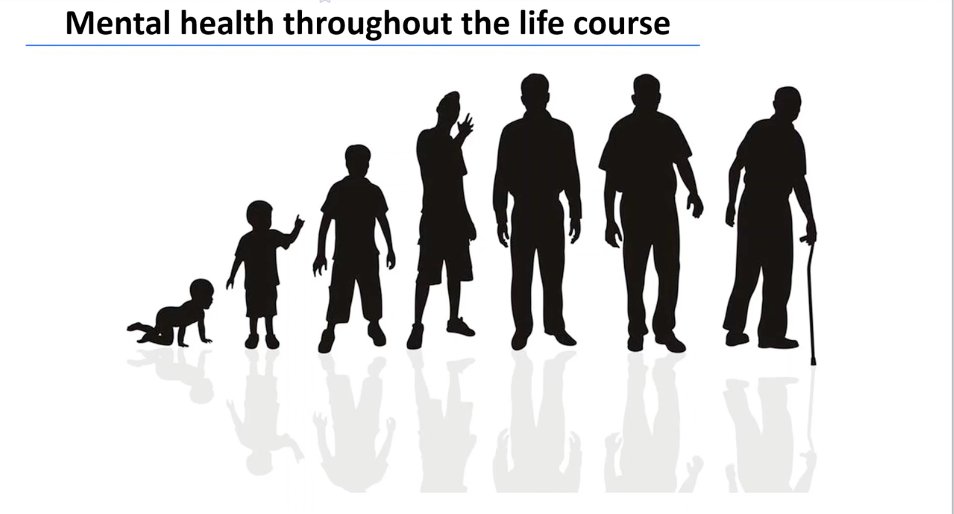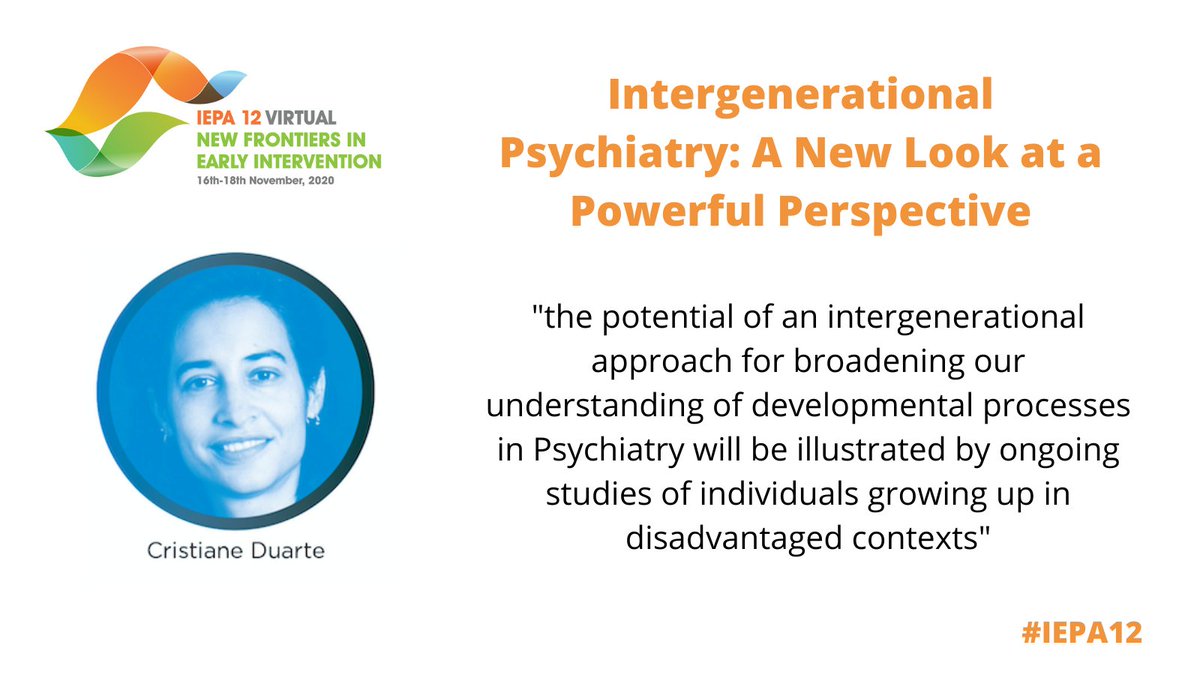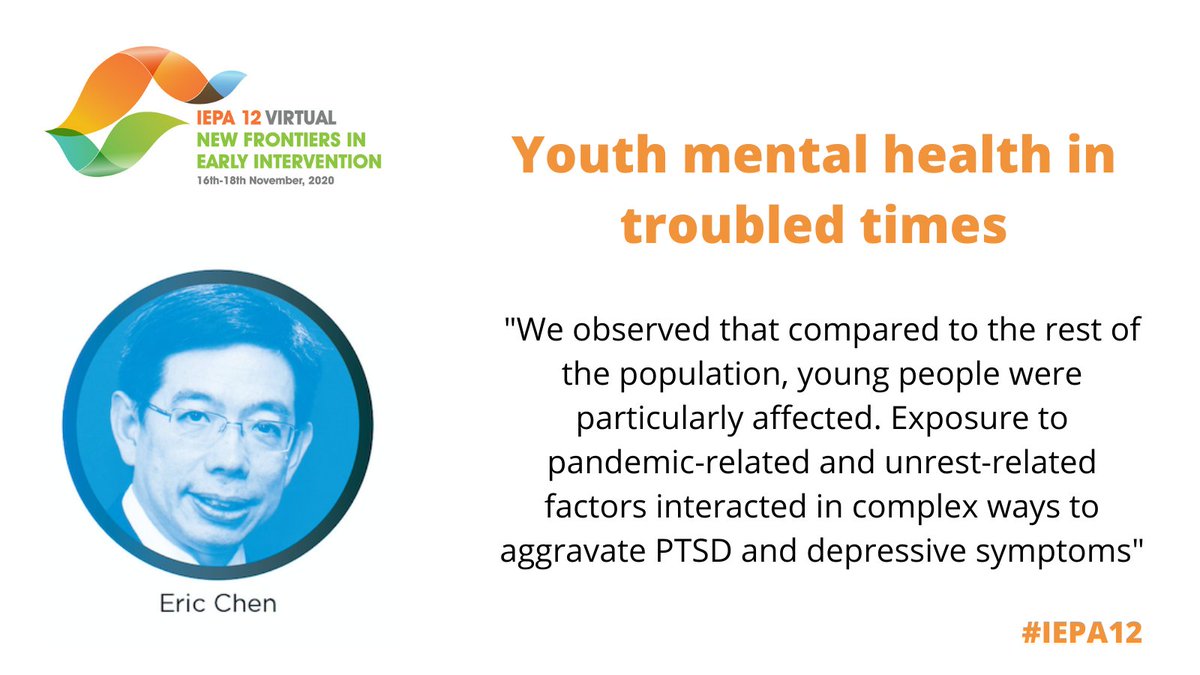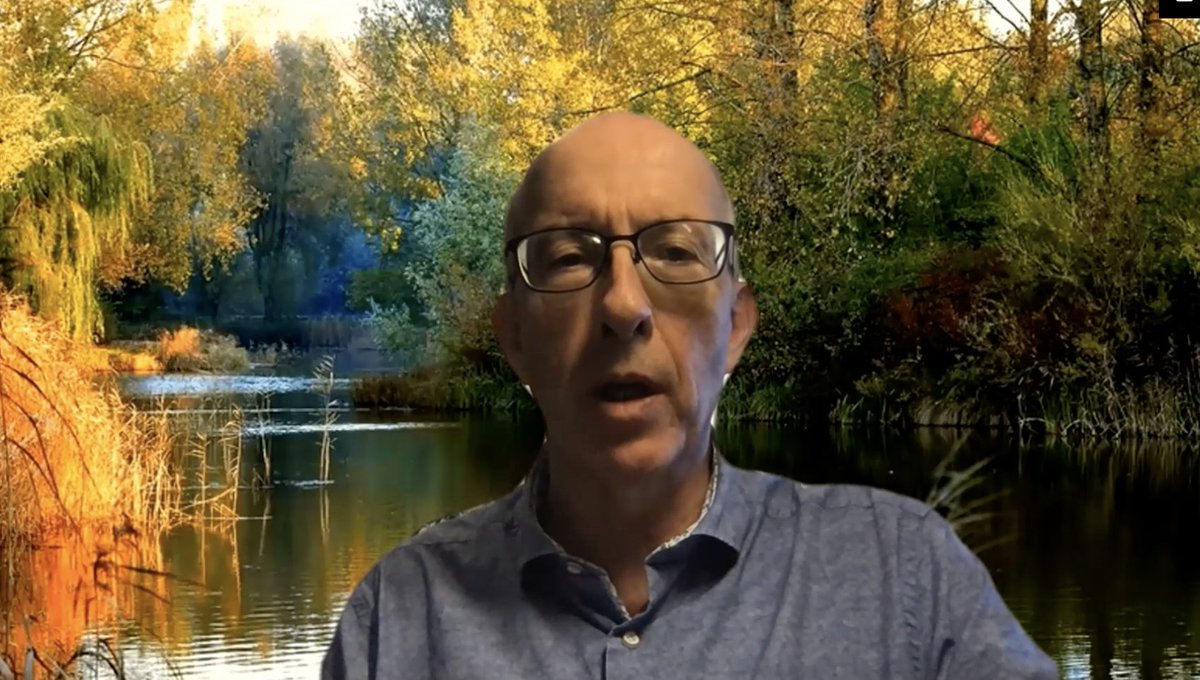
Our next #IEPA12 plenary talk comes from Juliana Onwumere @Families_MH from King’s College London who will be sharing some “Tales from the frontline: Understanding the impact of psychosis on families” 
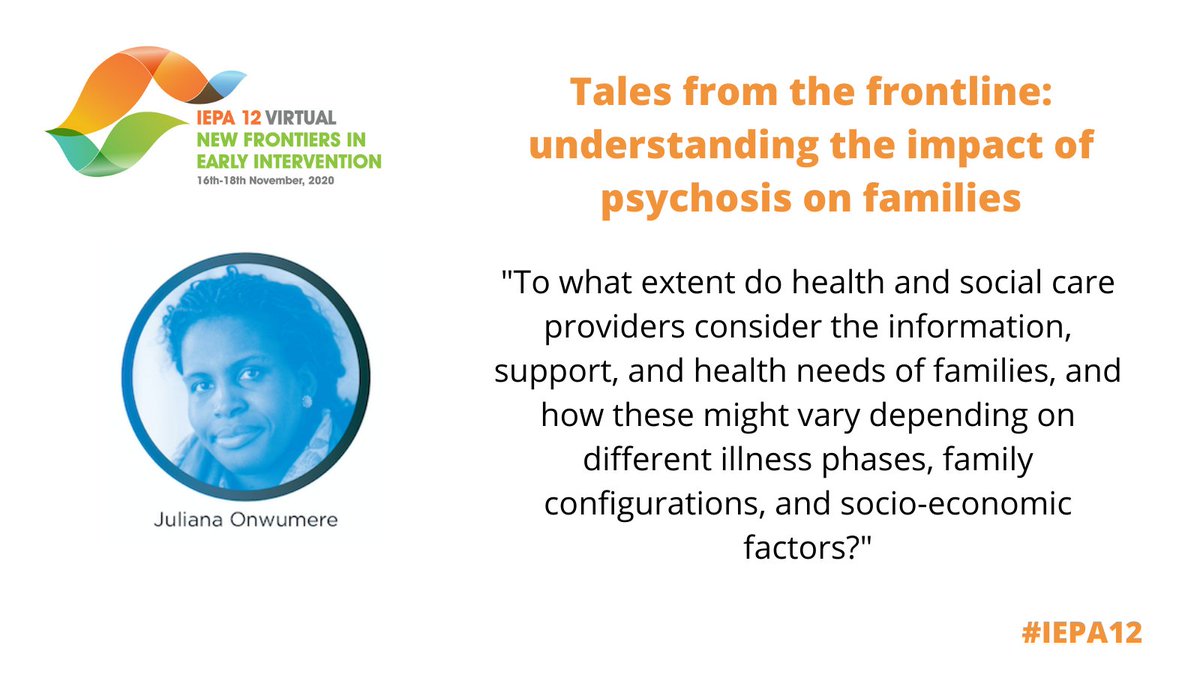
Onwumere begins by talking about the cognitive model of caregiving in psychosis, which she published with Elizabeth Kuipers and Paul Bebbington in @TheBJPsych back in 2010 doi.org/10.1192/bjp.bp… #IEPA12
We know that people with lived experience of psychosis can have significantly reduced social networks and informal carers can play an important role in these networks #IEPA12
In press research shows that caregivers of first episode psychosis patients play a vital role in initiating the first help-seeking attempt #IEPA12
Other work in India and Canada shows that greater family involvement can lead to better outcomes for people going through first episode psychosis #IEPA12 

Back in 2015 the AESOP-10 study showed the importance of family and carer support for people experiencing first episode psychosis #IEPA12 dx.doi.org/10.1097%2FNMD.…
We also know that being a caregiver increases our risk of experiencing mental health problems, and the greater the carer-workload the greater the risk. This association remains even after we control for other factors (e.g. reduced social support, debt) #IEPA12
Informal psychosis carers report poor physical and mental health. More recent work has looked at burnout in carers, which is similar to the levels of burnout found in nurses doi.org/10.1016/j.apnu… #IEPA12
But it’s not long-term caregiving that leads to burnout. Onwumere’s own work has found high levels of burnout in first episode psychosis carers as well doi.org/10.1016/j.comp… #IEPA12
Two thirds of carers in this study by Onwumere and colleagues reported clinically significant sleep problems, and of course poor sleep is linked to distress and negative caregiving appraisals doi.org/10.1111/eip.12… #IEPA12
Caregivers are impacted in other ways, which have seen much less attention, e.g. patient-initiated violence towards carers doi.org/10.1111/papt.1… #IEPA12
Onwumere is painting a bleak picture of what it is like to be a carer of someone living with psychosis:
-high levels of loss and grief
-PTSD symptoms
-social isolation
#IEPA12
-high levels of loss and grief
-PTSD symptoms
-social isolation
#IEPA12
But of course there are lots of different types of carers and it’s vital that we don’t view carers as one homogenous group with one voice. This study provides some useful perspective doi.org/10.1111/eip.12… #IEPA12
And there are also differences in carers along racial and ethnic lines, e.g. different beliefs about psychotic illness doi.org/10.1177%2F1363… #IEPA12
And what about siblings who care for their family members with psychosis? Onwumere cites the “really nice work” from Siann Bowman dx.doi.org/10.3389%2Ffpsy… which highlights the different positive and negative experiences and needs of carers #IEPA12
And there’s similar work looking at the emotional and mental health needs of young carers (a very hidden group) doi.org/10.1192/bjb.20… #IEPA12
It’s incredibly important that we compare the experience of psychosis carers with that of people who are caregivers for those with other conditions, e.g. arthritis, MS, epilepsy doi.org/10.1093/schbul… #IEPA12
How do carer experiences extend over time? Nutall et al looked at this and found that “reducing perceived family burden may improve patient quality of life.” #IEPA12 doi.org/10.1016/j.psyc…
What are the predictors and moderators of care-giver outcomes? The GET-UP trial did not provide any conclusive evidence. “The jury is still out” says Onwumere doi.org/10.1017/s20457… #IEPA12
Of course we must not ignore the physical health needs of psychosis patients and their carers, e.g. Perlick et al (2005) doi.org/10.1111/j.1399… #IEPA12
“Caring for a young person with FEP is associated with poor physical and psychological health” Poon et al (2018) doi.org/10.1177%2F1039… #IEPA12
The relationship between caregiving and service user outcomes is well worth considering, says Onwumere. Experimental research shows that exposure to carer criticism can lead to poor clinical outcomes for patients #IEPA12 
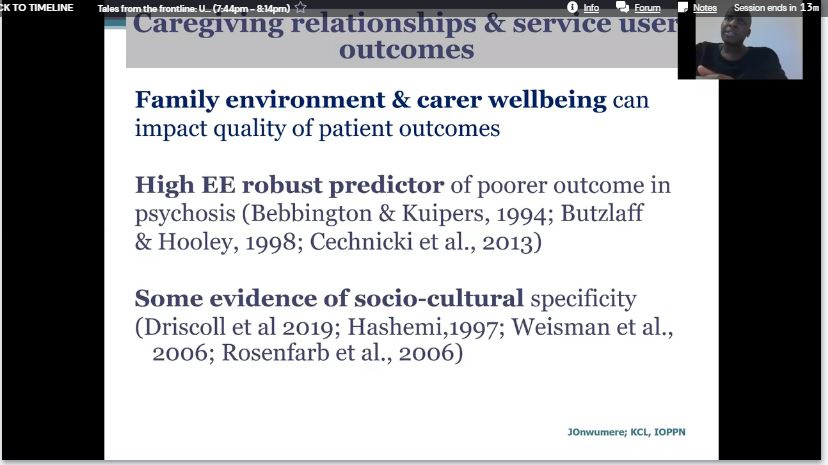
It’s important that we intervene if people with psychosis are suffering from poor family atmosphere and their health is suffering as a result, says Onwumere #IEPA12 

International treatment guidelines for psychosis and schizophrenia support families in different ways (e.g family interventions improving outcomes in early psychosis) doi.org/10.3389/fpsyg.… but of course people often find it difficult to access these family interventions #IEPA12
There are racial-ethnic disparities in first episode psychosis treatment outcomes, and people of colour are less likely to receive important services, e.g. family psychoeducation doi.org/10.1176/appi.p… #IEPA12
Peer interventions are very important in psychosis, as are culturally adapted family interventions. Nice to see Onwumere citing the work of @EdgeDawn here: sites.manchester.ac.uk/cafi/ #IEPA12
We’re really focused on how we can use digital technology to better support service users right now says Onwumere, and her recent review gives preliminary support for the feasibility & acceptability of digital interventions for psychosis caregivers dx.doi.org/10.2196%2Fment… #IEPA12
Onwumere talks now about the REACT Toolkit, an online self-help package or toolkit for relatives and friends of people with mental health problems associated with psychosis or bipolar disorder. Work led by @fionalobban #IEPA12
Onwumere ends her talk by mentioning the Caring for People with Psychosis and Schizophrenia free online @FutureLearn course, which explores the key issues related to caring for a relative with psychosis or schizophrenia (highly recommended) futurelearn.com/courses/caring… #IEPA12
@Families_MH #IEPA12
-Families (informal carers) of ppl w lived experience of psychosis have central role to play in recovery outcomes
-Families/carers have their own independent health/wellbeing needs
-Evidence gap: family physical/psychological needs, targeted interventions
-Families (informal carers) of ppl w lived experience of psychosis have central role to play in recovery outcomes
-Families/carers have their own independent health/wellbeing needs
-Evidence gap: family physical/psychological needs, targeted interventions
We’ve recorded a podcast interview with Juliana Onwumere @Families_MH, which will go live soon, so look out for that if you want to hear more about her brilliant work with families and carers #IEPA12
Now we have a live Q&A with Juliana Onwumere @Families_MH #IEPA12
An audience member asks: "could you say a bit more about the differences between cultural backgrounds, and the implications for care providers?". Onwumere responds that most research on race in psychosis is focussed on higher rates of psychosis in BaME groups #IEPA12
This research doesn't go further to explore how people might think about their experiences and how they might be impacted by these experiences. So at the moment, we can't say how we can best change practices to suit specific groups #IEPA12
"How can services support carers during the COVID-19 pandemic?". Onwumere feels it's fair to say that carers have not been at the forefront in terms of considering what their needs are, both their own and those they're caring for #IEPA12
Onwumere feels that going into our second lockdown, services should be thinking about the informal networks around service users, and how we can support them #IEPA12
"Do spousal caregivers have unique needs?" Onwumere states that most caregiving research focusses on parents but points out that partners have unique relationships including a physical relationship, which clinicians sometimes feel embarrassed to ask about #IEPA12
• • •
Missing some Tweet in this thread? You can try to
force a refresh





